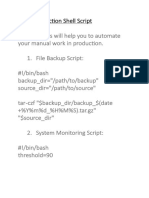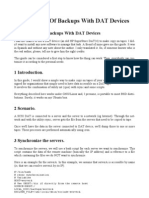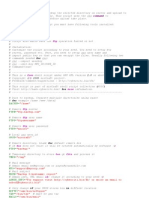0% found this document useful (0 votes)
53 views4 pagesBash Scripting For Automated Backups in DevOps
The document outlines various Bash scripts for automating backups in a DevOps environment, including web server backups, log archiving, database backups, and syncing backups to remote storage. It emphasizes the importance of automation, reliability, efficiency, and scheduling of backups to prevent data loss. Additionally, it provides cron job scheduling examples for executing these scripts at specified times.
Uploaded by
Ivan O. Moscosso G.Copyright
© © All Rights Reserved
We take content rights seriously. If you suspect this is your content, claim it here.
Available Formats
Download as PDF, TXT or read online on Scribd
0% found this document useful (0 votes)
53 views4 pagesBash Scripting For Automated Backups in DevOps
The document outlines various Bash scripts for automating backups in a DevOps environment, including web server backups, log archiving, database backups, and syncing backups to remote storage. It emphasizes the importance of automation, reliability, efficiency, and scheduling of backups to prevent data loss. Additionally, it provides cron job scheduling examples for executing these scripts at specified times.
Uploaded by
Ivan O. Moscosso G.Copyright
© © All Rights Reserved
We take content rights seriously. If you suspect this is your content, claim it here.
Available Formats
Download as PDF, TXT or read online on Scribd
/ 4



























































































